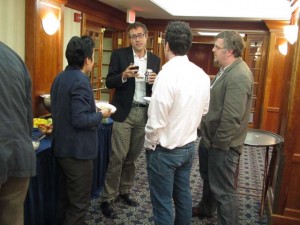Author Archives: e.hayot
Great moments in storytelling
e.hayot
From a piece on assholes in Slate:
One need only turn on the television to find oneself subject to the spectacle of an asshole condemning or defending another asshole, while yet a third asshole provides commentary on the assholishness of the previous two—a veritable Möbius strip of assholism.
I can’t tell if it’s because of my great love of the theorization of assholes, or because writing and thinking about assholes is inherently interesting (to everyone), but: the quality of prose, philosophy, and comedy regarding assholes truly does set it apart from the quality of those three things as they apply to every other topic in the universe.
The practice of happiness
e.hayot
Since many people seem to me to be too unhappy, and since I like being happy (and believe, therefore, that other people will like it too), I thought I would share with you a couple tricks I have for recognizing the good in my life, in the hopes that you might become happier by using them.
(1) Every once in a while I take a few minutes to imagine in a quite serious way how I would feel if a member of my family died. This is, honestly, hard to do vividly. Nonetheless worth it, as it fills me with a tremendous appreciation for the living presence of my loved ones. It occurs to me writing this that I should try doing this with my friends as well. I got this practice from William Irvine’s book on Stoicism, which I recommend to everyone.
A Guide to the Good Life: The Ancient Art of Stoic Joy
(2) A related, but happier, practice: I occasionally take a few minutes to see my good friends as their loved ones see them. Today in the car I spent some time imagining how my friend Colleen seemed to her now-husband (and my friend and riding partner) Lee the first time they met; then I flipped it around and imagined Lee from Colleen’s point of view. I ended up feeling a little bit in love with each of them myself, happy for them, and happy that I know them.
Both these practices mitigate against the tremendous danger of complacency about one’s own good fortune (earned solo or, more likely, acquired with the substantial help of others), the slow slide into ungratitude and habituation that accompanies the status quo. These exercises are designed to disrupt the stability of that status by reminding you of how fragile it is: in fragility it was obtained, in fragility it can all be lost. Every minute that it sustains itself is a small boon from the universe, a continuous miracle whose miraculousness lies precisely in its insane continuity, as you move through now, and even now… and still now! … and nothing has gone wrong that would destroy it. Isn’t that wonderful?
Luck and the welfare state, and Jules
e.hayot
A few months ago I got into a Facebook spat with a former high school classmate about the Obama “you didn’t build that” line. He reposted it; I replied, “…coming from the guy whose parents paid for a high-end private boys’ school education”; he said he didn’t understand what I was talking about and I then explained that he, like many other people, had benefited from a tremendous amount of luck, and that whatever he thought of his own life, he didn’t build that either. In the ensuing discussion (which ended with everyone unconvinced and me having a reason to dislike his seemingly stupid wife) I ended up pointing out that we all benefit a tremendous amount from a variety of forms of luck (or suffering from bad luck) and other kinds of explicit and implicit governmental and personal support, and saying that I’d rather live in a society in which the government acted to mitigate bad luck as much as possible via a tax on good luck.
This brings me to my son Jules. As many of you know, Jules was born with an unusual genetic disorder (9p deletion syndrome) whose long-term consequences are unclear. Short-term medical consequences included a submucous (under-the-skin) cleft palate, which required surgery a few months ago, as well as three weeks in the neonatal ICU ($20,000/day!) as his heart struggled to push blood through his body. For reasons no one understands — at one point a doctor suggested that we might want to let Jules die, rather than putting him through what seemed at the time to be a series of necessary surgeries to replumb his heart — Jules’s heart eventually grew out of its initially deformed state, and is now indistinguishable from a normal heart. Jules was also lucky, relative to other 9p deletion cases, to avoid distorted sexual organs, a misshapen skull (though you can still feel a ridge on his forehead where the bone fused a bit early), and a few other problems. Once the heart thing cleared up we were left with a moderate case of low muscle tone (seriously low–Jules couldn’t lift his arms off the ground for the first couple months; it took him a year to sit, and he’s only now, at 2 years 3 months, beginning to walk), speech and hearing delays (connected to the cleft palate and some malformation of his ears), and, though we don’t know the toll in the long run, some potential cognitive impairments.
(On the one hand, how unlucky to have a child with a disability! On the other, how lucky to have a disabled child who has a very mild case of the disability he has! But all this lacks context: because, finally, how lucky to have a child with this disability today, in the United States, in a family that has social and financial resources, and an extended familial and extrafamilial support network — as opposed to 50 years ago, or today in poverty or in a state in which disability is still a reviled and shameful thing. [More on that latter bit in a forthcoming post on Jules and my Chinese relatives.])
For disabled kids today the key words are “early intervention.” Research has shown that extensive efforts early in life can produce radically improved long-term outcomes for the child and his/her family. These outcomes have the advantage of being far cheaper for the state, which is why in the United States disabled children are automatically eligible for Medicaid, and why their physical and cognitive development is supported at the County and State levels (until age 5) and by school districts (from 5-18). As a result Jules has had since the sixth week of his life several hours of therapy a week. It’s now about seven — two hours of physical, two of speech, two of developmental, and one of occupational — all of which are designed to help maximize his genetic/cultural potential and to catch him up with his peers (or at least keep him from lagging further and further behind them). It’s thanks to the efforts of his wonderful therapists that Jules is doing so well today, that he’s made huge leaps both physically and communicatively, and has become a typical adorable and crazy-making two-year-old.
(Let me make the point again: this is cheaper for the state in the long run, since it reduces the amount of other kinds of lifelong support Jules will need [perhaps down to zero]. But it would be right, as I will suggest below, even if it were not just cheaper in relation to Jules alone.)
Anyway. I’ve been thinking about Jules and luck since the Mitt Romney 47 percent business. Obviously it’s always bad luck of a certain sort when a child is born disabled (I don’t buy the whole “it’s a chance from God to become a better person” nonsense). But it would have been much worse for Jules had we had to pay for the therapy ourselves. At some point we would have bankrupted the family, or had to cut back on therapy for Jules, both regrettable outcomes. Thinking beyond Jules himself, our daughter Lola would also have suffered, since through no fault of her own her opportunities to go to college would have been constrained by the family’s financial difficulties; likewise, Lola’s children (or Jules’s, if he ends up being socially and intellectually capable of having them [though he would have to adopt, given the 9p]) would have suffered a radical decrease in luck as a result of having impoverished grandparents.
Somehow for me the cascading effects of a piece of bad luck seem more clearly than anything else I’ve thought of in the last few weeks to illustrate the importance of the welfare state and the reliance down the generations on precisely the kind of “handout” that keeps a vast range of human possibility alive for its beneficiaries. Then I read that, according to Mitt Romney’s mother, the family spent a few years on “welfare relief” when George Romney was a young man, and I wonder at the human capacity to erase the memory of that bad luck, and the support that went with it, in order to produce a maximally self-aggrandizing narrative of personal triumph and success, as though we were all alone in the dark, swimming bravely against the currents, leaping forever alone into the great voids before us, and filling their emptiness with our giant, immortal, pillars of achievement.
I’d rather hold hands, and know that my hand’s been held.
Read of the day
e.hayot
This John Cole piece on how to think about the drone war without turning into an idiot about voting for Obama is very good–perhaps especially because he lays out so clearly such an excellent case for what is wrong with drones as they’re currently being used by the administration.
Song of the day
e.hayot
This is seriously the best thing I’ve heard in six months.
How blogging is like the mattress industry
e.hayot
So, reading around the internets today with the new PC 2.0 on the membrane, it occurred to me (as I passed through Kevin Drum, Andrew Sullivan, Balloon Juice, and the other usual suspects) that to be a professional blogger today you basically have to be willing to say almost exactly the same thing as everyone else for some significant percentage of the time. And then for some of the time you have to say something different, or say something about different things. And the reason people read your blog is because, (a) they know they’re going to get comments on the big issues of the day (in politics, today, the Pennsylvania Voter ID decision), and (b) they will also get some other stuff that is unique to you, more or less.
I don’t think it was like this years ago. That is, I feel like there was much more differentiation among bloggers of a certain type (politics) than there is now, and that one of the effects of the professionalization of blogging has been to push everyone towards more similar content, with minor differences that in the long run don’t amount to too much.
On that same subject this Rohin Dahr piece on the mattress industry is getting a lot of play. Here’s the block quote featured by both Drum and Sullivan:
The top four companies (Sealy, Serta, Simmons, and Tempur-Pedic) make up 59% of the industry revenue. The top fifteen mattress companies make up a whopping 81% of the market. Low levels of competition lead to consumers paying obscenely high prices for mattresses.
As Drum points out, this structure doesn’t seem that surprising in a mature industry. Perhaps that’s why blogging is starting to look like it.
Reprint: a mission statement, of sorts
e.hayot
For PC 2.0 I thought it might be nice to repost a few things from the archive, a way of remembering where we came from. Today’s reprint is my first post for Printculture, dated Dec. 9, 2004:
I came across the following in a book of interviews with Michel Foucault this morning:
It is the task of philosophy to explain what today is and what we are today, but without breast-beating drama and theatricality and maintaining that this moment is the greatest damnation or daybreak of the rising sun. No, it is a day like every other, or much more, a day which is never like another.What is today? What are we today, who live today as the central present of our lives, as that which makes our lives present to us? And how can we recognize–as a way of resisting a set of narratives that continue to tell us that this today is a day unlike any before, that we face a set of challenges that have changed “everything”–the ordinariness of today, including the ordinariness of its fear, its war, and its violence?
Whether it’s Sept. 11 or the recent presidential election [remember readers–this was December 2004!], I think the danger of imagining today as the one time (the greatest damnation, the new world world order) is that it gets in the way of thinking productively about an actionable relation to the future. The thing that changes “everything” always comes to us from an apparent outside (Al Qaida, red-state America) and because of that threatens to leave us feeling helpless.
The mysterious proximity of opposites
e.hayot
I wonder how you would explain to a recently arrived alien visitor to this planet that in cultural terms there is a great distance between the fraternity house culture that makes alcohol enemas possible (in the news as a result of this recent case at the University of Tennessee) and a man loving another man.
Most delightful datum from the Tennessee adventure: they were using (I almost wrote “drinking”) Franzia Sunset Blush. Like most of you I will be decanting a Zinfandel tonight to celebrate the miracles of human creativity.
p.s. NY Daily News headline: Bottoms Up?
Stealing a Shell: rewind
e.hayot
In the excitement of the reboot regular readers may have missed O Solovieva’s lovely post, “Stealing a Shell,” posted on the day that the site redesign happened and the old material got moved to the archive. I hereby direct you to it.
Why Johnny Can’t Write
e.hayot
The Atlantic has a nice debate up on the history of the teaching of writing that ought to interest several of our posters and commenters. As part of the series, Judith Hochman writes:
I have learned that celebrating writing is not the same as teaching children how to write — how to craft good sentences, develop a well-formed paragraph, and improve their work. Too often, teachers merely tell students to “add detail” or “summarize.” Frustrated students don’t know what to do, and many teachers haven’t learned the proper teaching skills in their graduate or professional development classes to effectively help them.
Make no mistake — done right, good writing instruction can extend learning. Diagramming sentences or doing page after page in grammar texts does not automatically result in better writers, although more able students enjoy these types of activities. There is evidence that confirms that teaching grammar in isolation does not lead to better composing. But research does confirm that when students begin to write more complex sentences, their reading comprehension improves. When they develop outlines, their organization and knowledge of text structure improves. When they respond to verbal questions using the prompts Tyre describes in the article, their oral language becomes more precise and sophisticated.
Stylish Academic Writing
The military-cultural complex
e.hayot
Items towards a longer piece, never to be written, theorizing/outlining the structure of the military-cultural complex:
1. At the Denver Broncos game this past Sunday, frequent announcements during the breaks in the action of various sorts of military heroes recently returned (or still in) Afghanistan, with much applause; also, country music with pro-military, pro-US themes. And of course a flyover by Air Force jets at the conclusion of the National Anthem, which was sung as representatives of the various US armed services (Coast Guard included, natch) stood at attention on the field.

2. The integration of video games, especially first-person shooters, with the US military in both explicit (America’s Army, a squad combat FPS developed by the US army) and implicit ways. (Similarly, in China, the MMORPG Anti-Japan War Online, sponsored by a branch of the Communist Party.)
3. The outpouring of anti-Japanese sentiment in recent days in China, which includes a variety of amusing and not-so-amusing instances of what strike me as purely “cultural” and actively imagined/imaginary response whose aesthetic dimensions exceed (however slightly) their political ones.
Key here would be to think about how the complex identified differs from the military-industrial complex; though obviously they’re almost entirely integrated it would be nice to figure out where they diverge–where, for instance, the values and norms (or even political positions) associated with the m-c complex would lead to resistance to warmongering or support for cuts in national defense budget. Not sure if that can happen.
China after comparison: report
e.hayot
 A Chinese-language report on the China After Comparison, Comparison After China workshop held two weeks ago at Penn State. Features photos of a number of PC regulars!
A Chinese-language report on the China After Comparison, Comparison After China workshop held two weeks ago at Penn State. Features photos of a number of PC regulars!
Blogroll: taking suggestions
e.hayot
If you have ideas for links in the blogroll, please put them in comments to this post and I’ll add them in. Thanks.
Printculture reboot
e.hayot
Hi there, folks. Printculture is undergoing some major changes. Things should look better around here in the next few hours. Thanks for your patience. While you’re waiting, a broken version of the old site and its material is available.
If you had a previous Printculture login, you should be able to use it now to log in to the site.

